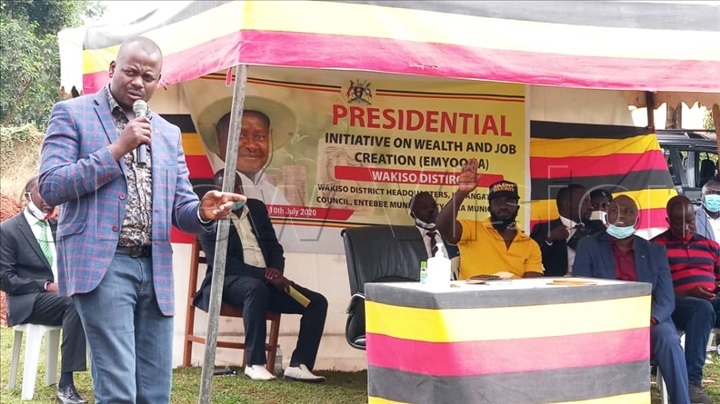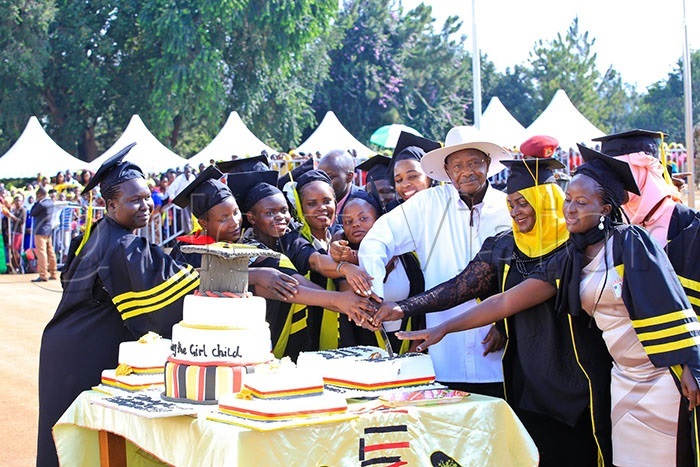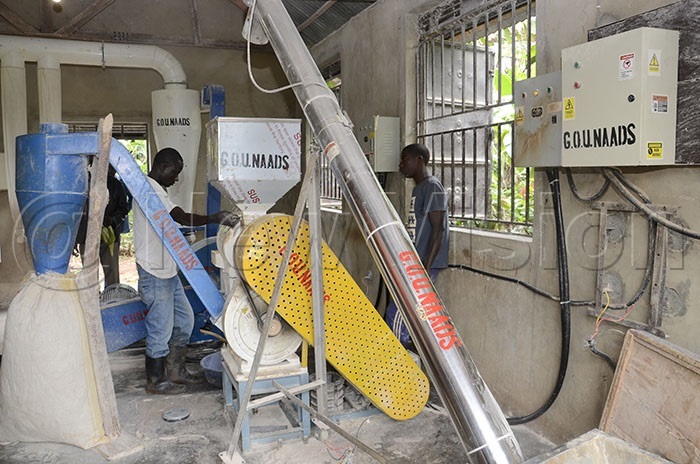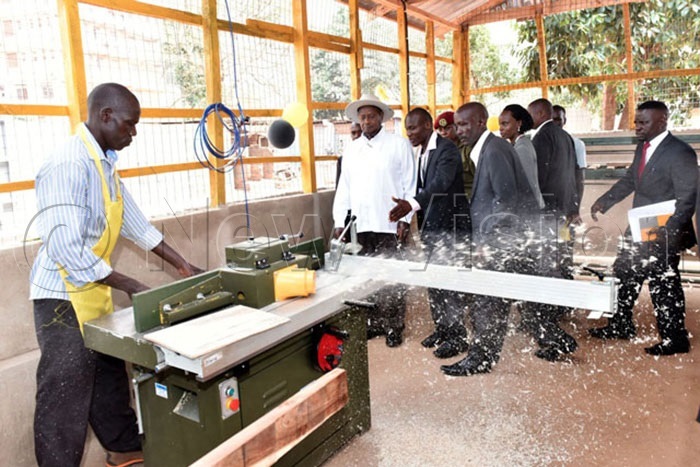Museveni's poverty eradication programmes registering success
The scheme will create jobs through specialised categories at constituency levels where each Sacco is entitled to money between Shs5m and Shs30 million.
POVERTY|MUSEVENI|EMYOOGA
In July this year, the government unveiled a Shs165.7b poverty eradication plan slated to alleviate Ugandans from poverty.
The new scheme dubbed 'Emyooga' targets Ugandans in the informal sector clustered in 18 groups.
The money that is slated to be managed by the Microfinance Support Centre under the coordination of the Ministry of Finance will be shared among beneficiaries in all sub-regions when they meet the requirements.
Haruna Kasolo, the Minister of State for Microfinance, said the government had already availed the funds to run for the next six months.
"Government has prepared programmes and the money is readily available as long as you are also ready and have fulfilled the necessary demands. It is to be used as seed capital within the formed Saccos," Kasolo said.
According to Kasolo, the scheme will create jobs through specialised categories at constituency levels where each Sacco is entitled to money between Shs5m and Shs30 million.
Kasolo says the government is targeting the informal sector such as Boda boda riders, carpenters, tailors, welders, fishermen, taxis, vendors, and salon operators.
Others are journalists, market vendors, veterans, produce dealers, and Persons with Disabilities (PWDs).
Kasolo said before money is issued, beneficiaries are supposed to form a Sacco of between seven and 30 members, register through District Community Development Officer (DCDO) and thereafter open up bank accounts on which the money shall be deposited.
But the newly created Emyooga is just one of the many poverty alleviation programs launched by the president to fight poverty and empower the locals economically.
Over the years, President Museveni has come up with initiatives to economically empower the masses and many of these have gone on register commendable success. Below we look at some.

The Anti-poverty tour
In 2016, the president embarked on a countrywide tour, aimed at showing the rural folks how with four acres of land, one can jump out of biting poverty.
Starting with Luweero, the host of the bush war struggle, Museveni, who has for long been against land fragmentation, said no meaningful commercial agriculture can be carried out on small pieces of land.
"For Luweero, the key, in my view, is the four-acre model. I will personally inspect farms on foot to ensure that I demonstrate how this model of one acre of coffee or tea, one acre of fruits, one acre of food and one acre of pigs/animals, works," he told a rally at Kawumu, where he established a demonstration farm.
Other than teaching the wanainchi how to prosper from well utilized four acres of land, the anti-poverty countrywide tour also aimed at enabling the president to supervise the progress of the Operation Wealth Programme (OWC).
The OWC programme had been launched three years earlier in July 2013 as an intervention to efficiently facilitate national socio-economic transformation, with a focus on raising household incomes and wealth creation by transforming subsistence farmers into commercial farmers to end poverty.

"This was after successful implementation with tangle outcomes of the pilot program launched to support Civilian-Veterans in the Luwero-Rwenzori Triangle," says Rogers Mulindwa, the National Resistance Movement secretariat publicist.
"The programme is aimed at among others mobilising the masses to engage in commercial agricultural activities to boost household incomes, distribute production inputs equitably and timely to boost production and productivity at household level, as well as facilitating rural technological upgrading to allow smallholder farmers transform themselves into small-scale industrialists," says Mulindwa.
He adds that the programme aims at stimulating local and community enterprise development across the country as well as facilitate infrastructure development, particularly in rural areas.
Abbey Ssemwanga, a chappati seller and resident of Isingiro town is full of praises for OWC.
"I was wallowing in poverty until I heard about OWC. I applied for a heifer and I was given an in-calf heifer three months later. The heifer gave birth in January 2016, and since then, my finances have had a turnaround," says Ssemwanga.
"I was milking fifteen liters every day, I would sell twelve and the three would be for my family. One day, one of the clients who buy our milk was not around and we found ourselves with a balance of two litres. Because there was no one to take the milk on that day, I decided to reward my chapatti clients with chapattis made from milk, I was trying out something, in fact, I did not know how the chapattis would be," Ssemwanga narrates.
"Interestingly, the chapattis came out with a unique taste and within one hour, I had sold over fifty chapattis, a figure that I would normally sell in over five hours. After realizing that chapattis baked with milk were delicious, I decided to start baking my chapattis with milk and sales kept on soaring after every other day," he adds.
Currently, Ssemwanga makes between 400 and 650 chapattis every day and sells each at sh1,000.
Altogether, Ssemwanga makes between sh400,000 and sh650,000 a day. Ssemwanga's financial turnaround is the one envisaged by the president.
Prior to OWC, the president had earlier in 2001 launched the National Agricultural Advisory Services, to improve the livelihoods of people in rural areas by increasing agricultural productivity and production.
"The role and responsibility of NAADS have been evolving since its establishment on the basis of lessons learnt from its implementation until 2014 when its mandate was refocused to providing support for the management of agricultural input distribution chains, promotion of strategic commodity interventions, agricultural chain development and farmer access to agricultural financing," says Khadija Nakakande, the NAADS spokesperson.

Presidential Initiative on Skilling the Girl Child
In 2017, President Museveni launched the Presidential Initiative on Skilling the Girl Child programme with the aim of equipping youthful girls with hands-on skills to enable them to create jobs and generate wealth.
The program started with 700 girls enrolled in two centers of Wandegeya and Subway, and currently, the programme runs in seven centers.
The girls are skilled in different vocations such as; knitting, weaving, embroidery, shoe-making, tailoring, hairdressing, baking, and confectionery.
After six months of training, the girls are awarded certificates as well as capital in form of cash and equipment depending on the course undertaken.
According to President Museveni, the skilling programme will not only empower youth financially but will also reduce imports.
"Needs give birth to businesses, research, and find out where the gaps are and offer solutions. Why should we continue to import textiles when we have people skilled enough to make them? Now that we have empowered you with skills, your role now is to finish away from the demand that we have in our country," Museveni challenged the girls while officiating at their graduation ceremony.
Faridah Mayanja, the programme coordinator says the project since its inception reduced unemployment levels.
"The girls are given hands-on skills as well as start-up capital. Even those who don't have money to go to other established vocational skills have been helped with skills for income-generation," says Mayanja.
"When women are empowered the whole community stands to benefit as they are in a position to contribute to the economic development of the country. ‘Give a man fish, and you feed him for a day, teach a man to fish, and you feed him a lifetime' this is a common adage we subscribe to as a program," said Mayanja.
So far, according to Mayanja, over 50,000 girls have been equipped with skills to enable them to beat the poverty bag.

Youth livelihood fund
In 2014, the president launched the YLP targeting the poor and unemployed youth between 18 and 30 years of age.
According to James Ebitu, the Director of Social Protection at the Ministry of Gender, Labour, and Social Development, the youth venture capital programme is administered through designated banks and the money attracts concessional interest rates.
"Beneficiaries can secure between Shs5m and Shs25m. These funds are paid back after the project has generated profits equivalent to the loan initially advanced to a particular youth group," says Ebitu.
"Thousands of youth have benefited from this programme and still counting. Youths are now running thriving businesses and earning a decent living courtesy of this programme. Over 100,000 jobs have been generated by this programmme," says Ebitu.
In the same vein, the president has since 2017 been facilitating various groups in Kampala with common user facilities to enable them to move to another level.
The facilitation includes equipping their workshops with modern equipment, scholarship, and vehicles to improve transport.
"I have personally come forward to help the people involved in various artisan trades that need help. Uganda today uses a lot of foreign exchange to import goods, yet we have got people who can produce these imports locally and all they need is to empower them," the president said.
Nsambya Furniture Makers' Chairman, Saddam Muleke says they have made big strides in their business following President Museveni's donation of a workshop to them.
"Because the facility is well equipped, we no longer have to go to other workshops for wood designing, and this has saved us money and time. We have also been able to train hundreds of youths in furniture making skills," says Muleke.
Other poverty alleviation programmes launched by the president include Prosperity For All programme dubbed 'Bona Bagagawale', Entadiikwa programme among others.
Yet, the president seems not to tire, while addressing leaders and the wanainchi in Mbarara recently, the president reiterated his commitment to fighting poverty.
"The Government has allocated more funds to intensify the fight against household poverty in the country through the formation of different Savings and Credit Cooperative Organisations that will manage the funds in their respective areas," said Museveni.
We are going to add more funds which will be given to specialized groups. What you have to do is to form SACCOS according to your specialty and manage your funds," the president said.